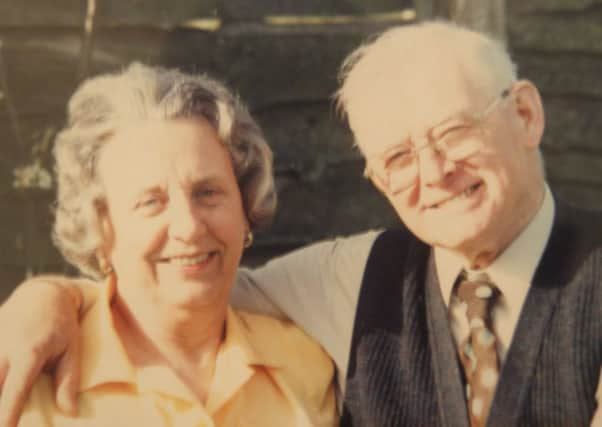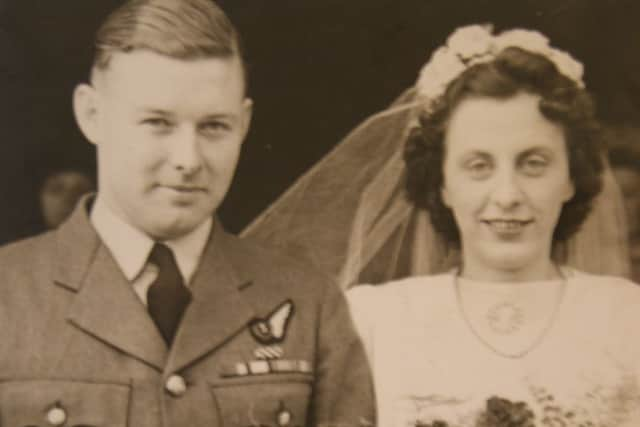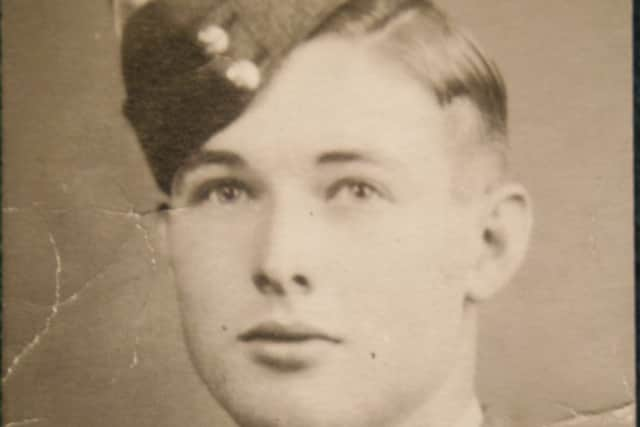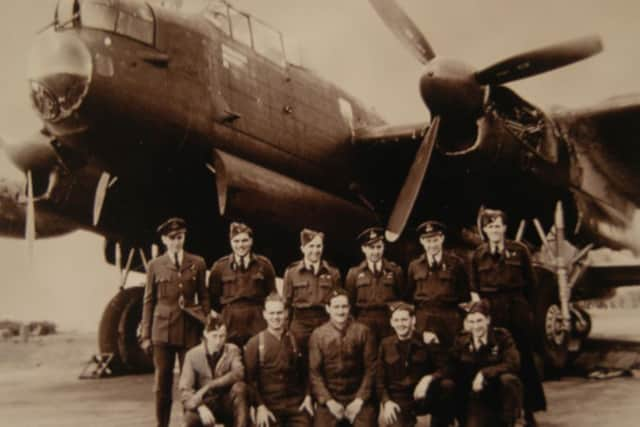Tributes paid to war hero


Tributes have been paid to a war hero who played a vital role in bombarding German defences – who died the same day the French Government dispatched their highest honour to him in the post.
Flight Lieutenant Austin Hallett, who was awarded an MBE and thrice medalled for his devotion to his country, died on his 94th birthday following a short illness.
Advertisement
Hide AdAdvertisement
Hide AdThe St Annes resident passed away in Victoria Hospital on the same day the Legion of Honour medal, awarded by the French to thank him for his bravery, was sent out in the post.


His son-in-law Mark Batty said: “I bet very few people who went into his Post Office knew he was decorated in the RAF.”
Born to a farming family in Dorset on November 12, 1921, Flt Lt Hallett’s story had humble beginnings.
But he became embroiled in extraordinary adventures that helped to mould modern Britain.
Advertisement
Hide AdAdvertisement
Hide AdThey include rubbing shoulders with the king after being shot by enemy fighter planes, a Land Rover tour of nuclear fallout-hit Hiroshima, and a daring dangle out of his own plane – in mid-air – to cut tangled parachute cords threatening to down his aircraft.


Despite the dramatic tales, the great-grandfather was a ‘modest and gentle man with a clear sense of honour and integrity’, his family said: “But as the stories highlight, he was brave, honest, and tenacious.”
Flt Lt Hallett, along with his late wife Val, who died last October, moved to Blackpool when he retired from the RAF in 1970, the same year he was named in the New Year’s Honours list.
Together, they bought Vernon House, a guest house in Coronation Street, which they ran for four years before taking over the Post Office in Lindale Gardens, South Shore.
Advertisement
Hide AdAdvertisement
Hide AdWhen Flt Lt Hallett turned 64, the duo retired to live in School Road before moving to a St Annes bungalow 12 years ago.


Mark, a solicitor living in Clifton Drive North, said: “He was a very kind-hearted man and never had a bad word to say about anybody.
“He was an extraordinarily nice man.”
Flt Lt Hallett will be buried following a small funeral service on Monday, with representatives from the Royal Air Force Association (RAFA) and Royal British Legion set to attend.
Sgt Rick Clement, who lost both his legs after stepping on a Taliban bomb in Afghanistan in 2010, said: “There’s not many of these guys left, they are quite literally a dying breed, but they are a breed that should be remembered.
Advertisement
Hide AdAdvertisement
Hide Ad“The war they were involved in was something someone like me, who has seen modern warfare, can’t comprehend.
“Without Flt Lt Hallett’s efforts – and with 310 hours of mission time he certainly did his bit and 10 times more -–I dread to think what it would be like over here.”
Tony Barratt from the South Fylde branch of the RAFA said: “Bomber command had 55,000 men during the war and their life expectancy in 1942 was three weeks.
“Try and imagine what courage it took to go out night after night and fly over enemy territory and to come back and there’s an empty bed, because somebody didn’t come home or has been shot down.
Advertisement
Hide AdAdvertisement
Hide Ad“It must have been horrendous for them but they still went.”
Flt Lt Hallett was 18 at the start of the Second World War. He joined a secretive Home Guard unit that operated from secret bunkers, preparing to attack the Germans in the event of an invasion.
His work was so dangerous he would keep his bomb-making kit, rifle, and ammo under his bed.
A year later, he trained in Blackpool as a wireless operator before transferring to the Isle of Anglesey to qualify as an air gunner.
Advertisement
Hide AdAdvertisement
Hide AdHe flew 35 missions, including one of the earliest attacks on Berlin, before completing his officer training and 13 further missions against targets in France and Germany.
He took part in air raids on June 6, 1944, softening German defences and targeting key strategic targets, completely unaware he had taken part in D Day until his return to England.
Flt Lt Hallett, having racked up 310 hours of flying across 48 bombing missions, was awarded the Distinguished Flying Cross.
It was during this time he met his future wife Val at a funfair in Darlington, with the pair courting until Flt Lt Hallett was posted to Burma.
Advertisement
Hide AdAdvertisement
Hide AdThe airman continued his career when the war ended, flying numerous sorties as part of the Berlin Airlift and to break the Soviet Blockade, for which he was awarded the Air Force Cross (AFC).
As well as Burma, Flt Lt Hallett was posted as far afield as Japan, India, Singapore, Cyprus, the Maldives, and Malta, where he worked in intelligence.
Having spent several years swapping long-distance letters with his love Val, the pair married in February 1948, a month after he moved home.
They went on to raise two daughters together, Jacqueline and Pauline.
Advertisement
Hide AdAdvertisement
Hide AdFlt Lt Hallett left the air force in November 1970, aged 49, after retraining as a catering officer, but kept his heroic exploits to himself, with his family only occasionally prying details out of him.
Mark said: “Like most people he was probably horrified by what he had seen and liked to keep it to himself. He was a very quiet man.”
A funeral service will be held at 12.45pm on Monday at St Annes Parish Church, before a burial at Park Cemetery in Lytham.
Those who wish to pay their respects are welcome to attend.
Flowers can be sent to Horsfield and Family Funeral Directors, in St Davids Road North, Lytham.
‘The day we should have been killed’
Advertisement
Hide AdAdvertisement
Hide AdFlt Lt Hallett dubbed it ‘The day we should have been killed’.
During a bombing mission to Frankfurt in November 1943, bullets from two enemy fighters tore through his Lancaster bomber, leaving a gaping hole inches away from his seat and the plane in a 12,000ft dive towards the ground.
Remarkably, the pilot recovered, although he couldn’t gain any altitude, sparking a perilous journey back to base just above the ocean.
King George later visited to see the bomber’s twisted wreckage and to honour the plane’s pilot, amazed it hadn’t gone down completely.
Advertisement
Hide AdAdvertisement
Hide AdPosted in Japan in March 1947, Flt Lt Hallett’s job was to transport Britain’s top military brass around.
The tale of the atomic bombs obliterating both Hiroshima and Nagasaki was well known but there was a sense of disbelief at the level of devastation they had caused.
So along with his crew, Flt Lt Hallett commandeered a Land Rover, headed north to Hiroshima and toured the city, completely unaware of the dangers of radiation poisoning.
While stationed in Burma, Flt Lt Hallett was dropping tent supplies by parachute when the cords became tangled around his plane’s rear fuselage, dragging the aircraft lower and lower.
Advertisement
Hide AdAdvertisement
Hide AdWith the pilot losing control, Flt Lt Hallett was ‘volunteered’ to cut the aircraft free by laying out the back of the plane, hanging thousands of feet in the air with only his comrades’ hands holding onto his ankles for safety.
He later told his family he was picked because he was the most expendable if he fell to his death.